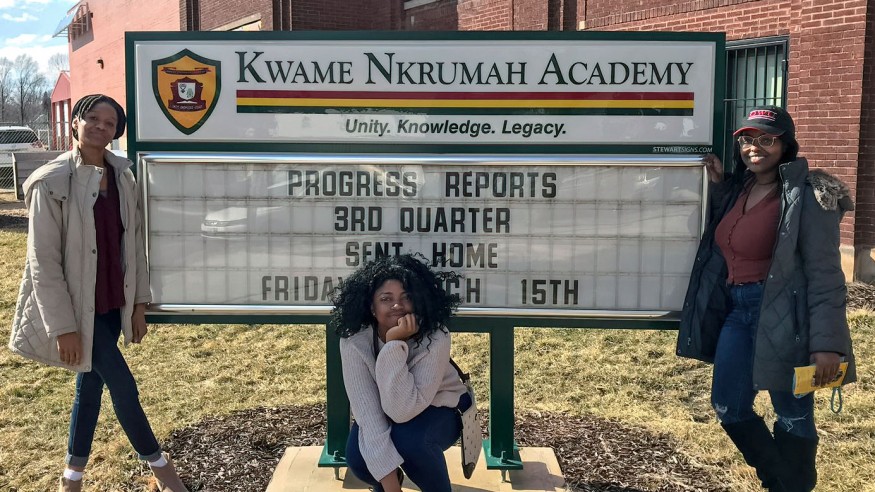
Afro-Centric Education
Ohio Wesleyan Students Explore Operations of Chicago Charter School
Name: Eva Churu ’19
Hometown: Newark, Delaware
Majors: Pre-Medicine/Pre-Dentistry
Minor: Chemistry
OWU Connection experience: Small Grant to explore the educational model of Kwame Nkrumah Academy in Chicago, Illinois
Churu and Ohio Wesleyan students Raissa Kanku ’19 of Kinshasa, Democratic Republic of Congo, and Emma Tarawally ’20 of Claymont, Delaware, traveled to Chicago during spring semester to visit Kwame Nkrumah Academy, an inner-city school with a global model for African-centered teaching and learning. At the school, they were able to observe the dynamic of the classrooms and compare it to their own studies. Their trip was supported by a Small Grant from The OWU Connection program.
Lessons Learned
“Upon arrival, we noticed how the school was in a deep urban neighborhood where the roads were so neglected that it was difficult to drive over 10 miles per hour in order to get to the school safely. ...
“The school was decorated mainly with black, red, and green; colors of the pan African flag. There were also some murals of prominent leaders of the Black community such as Martin Luther King and Nelson Mandela. There were also desk decorations with traditional Kente Cloth from Ghana. We noticed many attributes of the school that were Afro-centered, which made me almost jealous of the students at the school. ...
“When it came to the curriculum, we were interested to know how history is taught in the school, especially black history. We were informed that the way they teach black history is different from how it would be taught in a white institution.
“For example, black history does not begin with slavery or colonialism. Rather, it begins with African ancestors who were inventors, innovators, kings, queens, and healers. This feeds the students a sense of history that is empowering, instead of demeaning.
“It goes to show that, like in Christianity, Western education might have the same impact of liquidating the culture and values of children across all Western countries, and educators should be more aware of the curriculum and setting of learning environments and how it affects their students.”
Connections with OWU Courses
“In Religion 353, we learn about Christianity and how it is basically a Western religion and how this is obvious in much of Christian traditional metaphysics, ethics, and sacraments, which are rooted within Greek philosophy.
“We also learn about how missionaries were always sent to non-Western cultures, which had their own ethics, rituals, and beliefs. With this in mind, we tackle sensitive issues of Christianity and the encounter of non-Western religions and whether Christianity should liquidate other religions through missionary work or Crusade.
“I believe this kind of thinking could be applied to Western education as well and its impact on African American, and African diaspora students such as me.”
The Bigger Picture
“I believe that the Western form of education, especially in young children, may have limiting impacts on their trajectory of learning.
“For example, in the black community and various African communities, there is a mentality of ‘the village raising the child.’ This means that a community will take each child as their own and ensure that they are well taken care of, even if the biological parents are not around.
“I saw this put in practice at the academy because each teacher was referred to as ‘mama’ or ‘baba’ by the students. This also meant that all the staff knew each child’s name and showed concern about their daily routine.
“I believe that being in a school like this, especially for African American children, gives them a sense of community and relates to their educators as family instead of authoritative figures. This then gives them a sense of comfort that they would otherwise not have.”
